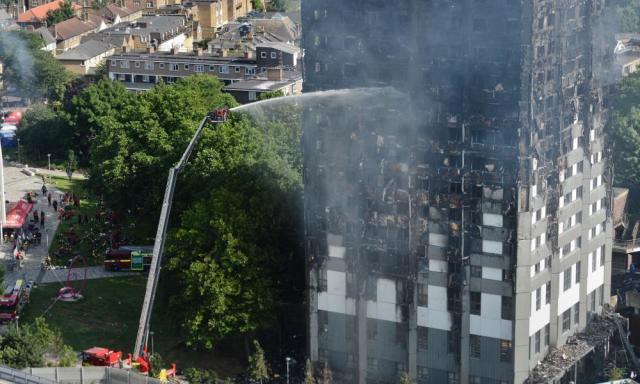'
Lack of equipment 'hampered Grenfell rescue effort'
 Harriet Grant,The Guardian 6 hours ago https://uk.yahoo.com/news/lack-equipment-low-water-pressure-000302111.html
Harriet Grant,The Guardian 6 hours ago https://uk.yahoo.com/news/lack-equipment-low-water-pressure-000302111.html
A lack of suitable equipment, low water pressure and radio problems hindered the response to the Grenfell Tower disaster, firefighters who attended the scene have said.
Some of those present told a BBC Newsnight investigation that they had struggled to get through on their radios with vital messages because of an overuse of the system, as well as the difficulty of getting a signal through several floors of concrete.
According to the programme, a 30-metre-high “aerial ladder” did not arrive at the scene until more than half an hour after the first fire engines were dispatched.
Two hundred firefighters responded using 40 engines and a range of specialist vehicles to the fire in west London that killed at least 80 people.
Newsnight journalists obtained a copy of the “incident mobilisation list” that lists all the fire crews called to the scene from across London by time of arrival, as well as the equipment brought in. It said 200 firefighters responded with 40 engines and a range of specialist vehicles,
The document reportedly states that the aerial ladder was not dispatched until 1.19am, 24 minutes after the first crews were sent to fight the fridge fire that started the blaze. Although the ladder could reach the 10th floor, by 1.32pm when it arrived, the fire had reportedly travelled further up the 70-metre high building.
The general secretary of the Fire Brigades Union, Matt Wrack, said he had spoken “to aerial appliance operators in London ... who attended that incident, who think that having that on the first attendance might have made a difference”.
On 22 June, just days after the fire, the London Fire Brigade (LFB) introduced a change so that any pre-determined response to a high-rise building fire was increased from four fire engines to five fire engines and one aerial appliance.
The tallest aerial tower in the country, which is 70-metres high, is based in Surrey and did not arrive until the fire had been burning for several hours. Commissioner Dany Cottonhas already said the LFB is considering buying taller aerial platforms.
Former chief fire officer Ronnie King defended the LFB, telling Newsnight: “Not many people, if any, in this country have seen a fire in a block of flats full of people asleep. I don’t think anybody could have contingency planned for that, our buildings should be safe.
“All the firefighting operations are predicated on firefighters fighting from the inside not the outside. Obviously it would be excellent to have an aerial platform but in reality they would be standing idle for long periods.”
Newsnight’s investigation also reported that the fire service had to call Thames Water to ask the company to increase pressure in the area after firefighters struggled to battle the extremely high temperatures and strong flames.
One firefighter told the programme: “The fire floors we went in were helmet-meltingly hot … when we were clearing flats, it was a case of a quick look and closing doors because the water pressure wasn’t up to firefighting.”
A Thames Water spokesman denied the charge, saying: “Any suggestion there was low pressure or that Thames Water did not supply enough water to fire services during this appalling tragedy is categorically false.”
A London Fire Brigade spokesperson told the Guardian that the organisation would not be commenting on any of the claims made in the Newsnight film because of the ongoing official inquiry and police investigations into the fire.
They said in a statement they said: “Due to the police investigation and public inquiry it would be wrong for the brigade or its employees to comment on this level of detail at this time.”
The official judge-led inquiry into the fire is due to start hearing evidence in September. '
No comments:
Post a Comment